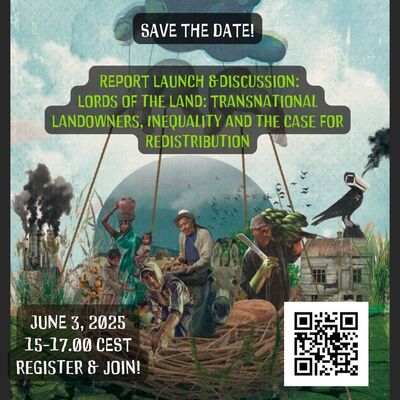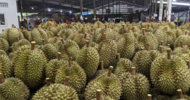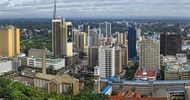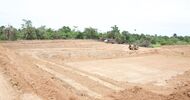Agricultural land represents an $8.4 trillion market, of which institutional investors own about $30 billion to $40 billion, according to Macquarie Agricultural Funds Management.
- Bloomberg
-
05 December 2012
Indonesia sits at the heart of the global palm oil trade. In 2002, one company PT Erasakti Wira Forestama (EWF) offered villagers in Batanghari, Jambi province a one-time payment for their land. Peatlands were converted to plantations — and the repercussions of the decision are still felt today.
Some villager
Many of the world’s biggest pension funds as well as family offices of wealthy individuals –looking for diversification and steady returns in times of market volatility– have been pouring money into farmlands, writes Kelvins Tan
- The Edge Malaysia
-
06 December 2012
Despite all the hypocritical calls and posturing of the International Monetary Fund and the World Bank for ending hunger, they have facilitated, enabled, and led the global rush for landgrabs
According to a report released today by leading environmental and social justice advocates, the investment management firm TIAA is leading a trend of speculating in land markets, which drives up farmland prices and displaces family farmers.
"Land consolidation is the only way,” Peter Beerents, chief executive officer of Dutch farmland investment firm Cibus Land Management Srl.
- Bloomberg
-
24 October 2014
This piece is part of "Water Grabbers: A Global Rush on Freshwater", a special National Geographic News series on how grabbing land—and water—from poor people, desperate governments, and future generations threatens global food security, environmental sustainability, and local cultures.
- National Geographic
-
14 December 2012
This report identifies broad trends in farmland investing with the potential to affect countries in the Global North and Global South
“We can have a nice debate about foreign investment here in Australia, but in the global context it isn’t a discussion about whether it is nice to have, we need it, we absolutely need it.”
A decade after capitalism transformed Russian industry, an agricultural revolution is stirring the countryside. The change is being driven by soaring global food prices (the price of wheat alone rose 77 percent last year) and a new reform allowing foreigners to own agricultural land. Together, they have created a land rush in rural Russia.
- New York Times
-
31 August 2008
The University of Iowa Faculty Senate voted 42 to 7 to pass a resolution calling on the university to hold the financial services provider TIAA accountable for its investments in global farmland.
- ActionAidUSA
-
28 April 2021
Real asset investments held by the fund include farmland and natural resources.
- Global Money Management
-
03 December 2010
A small but growing number of the world's wealthy are shoring up their portfolios with investments in forestry and farmland in an effort to take the sting from losses in more traditional assets as the financial crisis trundles on.
For private equity houses, pension funds and family offices, the sprawling farms of sub Saharan Africa are the new land of plenty.
Only the Amazon and Congo basins rival Papua New Guinea for pristine tropical wilderness. But 5 million hectares of its jungle is under threat from foreign land grabs and back-door logging.
- Global Mail
-
05 February 2014
More important is for Africa to realise its own potential for food production, which would in the long-term negate the need for these deals.
- Global Dashboard
-
13 May 2009
For all the willing buyers seeking tracts of Australian farm land, local investors are not among them. They wonder what all the fuss is about.
The $23.6 billion Iowa Public Employees’ Retirement System and the $600 million Tucson Supplemental Retirement System are currently exploring potential investments in farmland as a means of diversification.
- Farmland Forecast
-
31 August 2011
The cooling domestic equity and bond markets has prompted endowments and foundations to give niche alternatives, such as farmland, a closer look.
O medo de Harvard se manifesta em 2.000 páginas de registros judiciais brasileiros, incluindo a transcrição da teleconferência
- Info Money
-
24 September 2019
Chinese producers in Brazil should not export soybeans to China, but chicken, says former Minister of Agriculture Roberto Rodrigues, now director of the FGV Agribusiness Center
- Global Finance
-
01 October 2018
A New York company managing the retirement savings of workers in Sweden, the US and Canada is evading Brazilian laws on foreign investment to acquire farmlands from a businessman accused of violently displacing local communities.
In 2013, mammoth US investment company TIAA-CREF gave $5 million to the University of Illinois to fund a research center, branded with the company’s name, that would explore the financial niche of farmland investment.
- Illinois Newsroom
-
16 November 2021
Companies from countries across the world have acquired fertile Nile-irrigated land for growing food crops, non-food agricultural commodities such as alfalfa, flowers, tobacco, and biofuels, rearing livestock and logging trees.
- Pulitzer Center
-
01 February 2020
A controversial foreign investment to produce agrofuels for Europe on 20,000 ha in Senegal has angered communities and sparked violent clashes between peasants and the police.
- CRAFS, GRAIN, Re:Common
-
07 November 2013
MCC is playing a key role in commodifying Africa’s farmlands
For the world’s people to have secure access to the quantity and quality of food needed for a decent life, the land grabs and the development of large, highly mechanized factory farms must stop.
- Monthly Review
-
02 November 2013
"In the age of derivatives and evaporating valuations, farmland is gold with a cash flow."
Farmers along Colorado's Grand Valley are concerned a New York City-based hedge fund is buying farmland to speculate on water.
- Inside Climate News
-
08 June 2020
The shameful story of how 1 million black families have been ripped from their farms. A war waged by deed of title has dispossessed 98 percent of black agricultural landowners in America.
- The Atlantic
-
12 August 2019
















